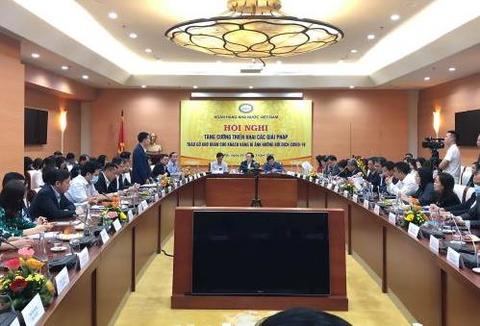 |
|
View of the conference.
|
During a meeting with the institutions in Ha Noi, Nguyen Quoc Hung, director of the SBV’s Credit Department, said many measures have been applied to the VND222 trillion (US$9.65 billion) of loans, such as rescheduling debt payments, reducing lending interest rates and lowering services fees.
According to Hung, the SBV’s National Credit Information Centre (CIC) has also cut the price of its credit information products and services given to credit institutions, to help the institutions cut operating costs, enabling them to lower interest rates.
Nearly 30 banks have so far slashed the fees for interbank transfers following the move of the National Payment Corporation of Vietnam (NAPAS) to cut switching fees.
At the meeting, SBV Deputy Governor Dao Minh Tu praised the institutions for their active support to affected firms, and urged them to enhance measures to improve assistance.
To officially facilitate credit institutions overcome difficulties and losses, Tu said the SBV was co-operating with relevant ministries and branches to urgently streamline the legal system, including the issuance of a circular guiding credit institutions to restructure loan repayment, exempt and reduce interest rates.
According to Hung, the coronavirus outbreak had so far adversely impacted the business of many borrowers, which had also put strain on their solvency and poised to risks of overdue and bad debts.
It was reported by the end of last year, bad debt ratios decreased at 16 out of 22 banks that have released their fourth quarter finance statements. The bad debt ratio of the banks had decreased from 1.7 per cent to 1.48 per cent.
S&P Global Rating predicted the bad debt ratio of Chinese banks may rise to more than 6 per cent if the epidemic continues.
In Viet Nam, the initial impacts on the national economy have become clear.
Hung said 23 credit institutions had so far reported to the central bank that some VND926 trillion outstanding loans belonged to borrowers affected by COVID-19, accounting for 11.3 per cent of the total outstanding loans of the entire banking system.
A number of industries, which have suffered heavy losses, include agriculture, forestry, fishery, businesses with import and export activities, accommodation services, food, beverages, transportation, textiles, leather and footwear, electronics, refrigeration, oil and gas, tourism and education.
According to Standard Chartered Bank, Viet Nam’s credit growth rate was estimated to slow significantly in the first quarter of this year, at 4.5 per cent, but would recover from the second quarter of 2020, estimated at 6.5 per cent, and would continue to increase to 7.2 per cent in the last two quarters.
Head of a joint-stock commercial bank based in Ha Noi, who declined to be named, said after the Lunar New Year, the amount of money people deposited was quite large, one and a half times more than normal days.
Meanwhile, the deposits of businesses still stayed in the bank. Most businesses had not shown any signs of coming back to production and business activities.
High deposit and low credit rates therefore would also partly affect banks' business performance this year. — VNS

VN businesses seek Government support amid coronavirus losses
The coronavirus outbreak has affected the country’s economy, with production for exports and services suffering the most.

COVID-19 brings turmoil to real estate market of Vietnam
COVID-19 has had a strong impact on the global economy, and the property market has not managed to escape the blow.
 Credit institutions have so far supported more than 44,000 COVID-19 affected customers following directions from the State Bank of Viet Nam (SBV), an official reported on Monday.
Credit institutions have so far supported more than 44,000 COVID-19 affected customers following directions from the State Bank of Viet Nam (SBV), an official reported on Monday.